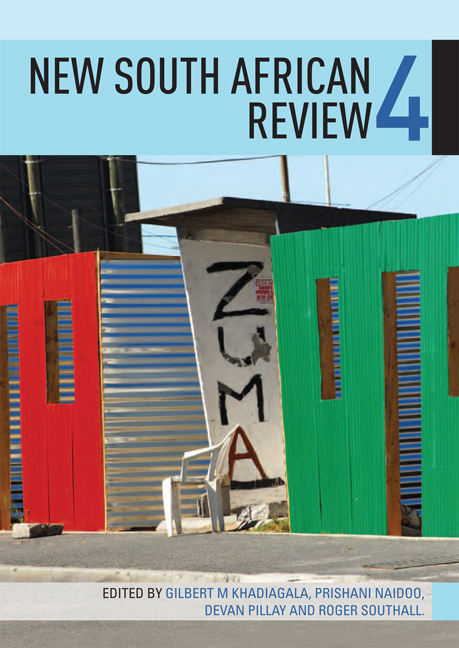Book contents
- Frontmatter
- Contents
- Preface
- Introduction: South Africa's fragile democracy: Twenty years on
- PART ONE ECOLOGY, ECONOMY AND LABOUR
- Introduction
- Chapter 1 The South African labour market after eighteen years: It's class struggle, stupid!
- Chapter 2 The state of organised labour: Still living like there's no tomorrow
- Chapter 3 Citizen Wal-Mart? South African food retailing and selling development
- Chapter 4 Transcending South Africa's oil depen
- Chapter 5 The politics of electricity generation in South Africa
- PART TWO POWER, POLITICS AND PARTICIPATION
- PART THREE PUBLIC POLICY AND SOCIAL PRACTICE
- PART FOUR SOUTH AFRICA AT LARGE
- Contributors
- Index
Introduction
from PART ONE - ECOLOGY, ECONOMY AND LABOUR
Published online by Cambridge University Press: 21 April 2018
- Frontmatter
- Contents
- Preface
- Introduction: South Africa's fragile democracy: Twenty years on
- PART ONE ECOLOGY, ECONOMY AND LABOUR
- Introduction
- Chapter 1 The South African labour market after eighteen years: It's class struggle, stupid!
- Chapter 2 The state of organised labour: Still living like there's no tomorrow
- Chapter 3 Citizen Wal-Mart? South African food retailing and selling development
- Chapter 4 Transcending South Africa's oil depen
- Chapter 5 The politics of electricity generation in South Africa
- PART TWO POWER, POLITICS AND PARTICIPATION
- PART THREE PUBLIC POLICY AND SOCIAL PRACTICE
- PART FOUR SOUTH AFRICA AT LARGE
- Contributors
- Index
Summary
Twenty years after the start of democracy, the labour movement in South Africa, which has always sought to re-embed the economy into society, is now realising that this is insufficient – it also has to be re-embedded into the natural environment from which it draws its sustenance. This has long been realised by social theorists such as Karl Marx, who understood that both land (that is, nature) and labour are the sources of value (something both Marxists and non-Marxists in the twentieth century have completely misunderstood). In the 1930s the social democrat Karl Polanyi saw the dangers in the commodification of land and labour (through the so-called ‘self-regulated’ market) leading society to the edge of a precipice.
In other words, instead of what Ben Fine calls ‘economics imperialism’ – where the dismal science holds sway over all else – the economy has to be subordinated to society and the natural environment. The Congress of South African Trade Unions (Cosatu), and in particular its largest affiliate, the National Union of Metalworkers of South Africa (Numsa), have produced policy papers over the past year that begin this journey of realisation. Jobs in the future have to be decent green jobs in industries that use renewable energy. Indeed, Numsa goes further and calls for a socially owned renewable energy sector, in recognition of the dangers that the ‘green economy’ embraced by our government – in keeping with the dominant global discourse – is little more than green neoliberalism, where large corporations seek to make huge profits out of the ‘sustainable development’ industry.
The National Development Plan (NDP), which impressively examines the full dimensions of climate change and ecological destruction brought on by incessant economic growth and consumption, ends up with policy proposals that effectively negate this insight. It gives primacy to the minerals-energy-financial complex – indeed, Cosatu views the economics chapter in the NDP as a leap backwards to the orthodox economics of the much reviled Growth, Employment and Redistribution (GEAR) policy, which has brought massive inequality, rising unemployment and persistent poverty. On labour issues the NDP mainly envisages the creation of low-paid informal jobs, and has no ambition to tackle social inequality.
- Type
- Chapter
- Information
- New South African Review , pp. 18 - 20Publisher: Wits University PressPrint publication year: 2014



